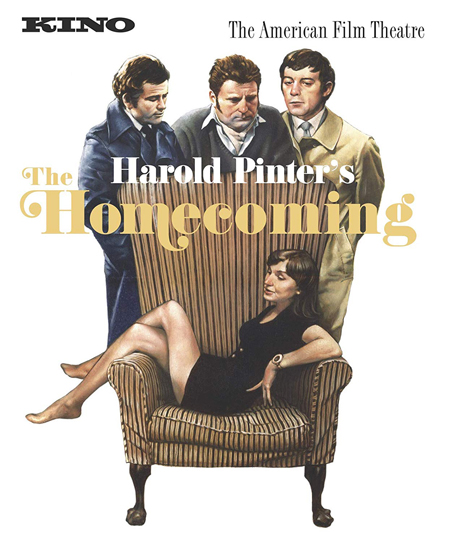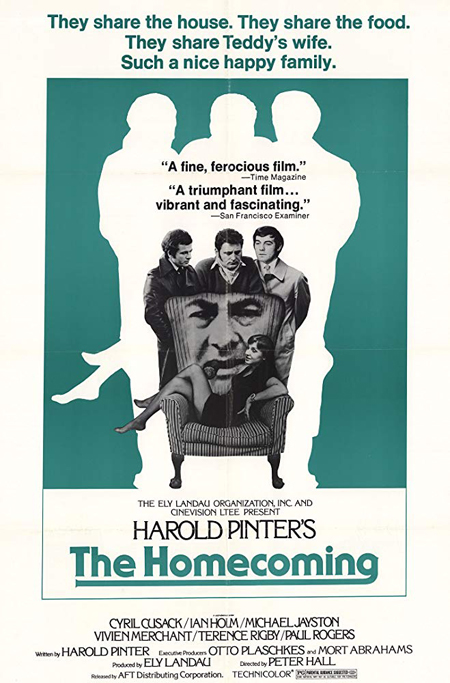
“THE
DEFINITIVE PINTERâ€
By
Raymond Benson
Cinema
Retro has
featured articles and reviews of several titles in the “American Film Theatreâ€
series.
To
recap: Back in 1973, producer Ely Landau and his wife Edie launched a daring
and unprecedented cinema series that played in the U.S. for two “seasons,†with
a total of fourteen titles (but only thirteen were shown), all renowned
works—classic and modern—originally produced on the stage. It was called the
American Film Theatre. (A review of a DVD box set of the entire series appeared
on Cinema Retro. Click here to read.)
The
concept tried something different. The directive was to take a great stage play,
not change a word, and in most
cases, use the actual play script as the screenplay. The next step was to hire
an accomplished film director to interpret the text for the film medium but stay faithful to the play.
Sometimes the director was the same person who helmed the original stage
production. A further step was to persuade the original casts from the Broadway
or London productions of those plays to star in the film; or, when that wasn’t
possible, to cast big-name Hollywood or British actors. Thus, the result was
indeed a filmed play—but you as an audience member wouldn’t be watching it from
the middle of the orchestra or from the side or from the first balcony; instead
you were up close and personal in a realistically-presented world (on studio
sets and/or real interior or exterior locations)—just like in “regular†movies.
You had the best seat in the house, so to speak, but there’s no proscenium
arch. It’s a movie. But it’s a play.
Kino
Lorber has slowly been re-releasing the titles from the American Film Theatre
in individual packages, upgraded to high definition Blu-ray. The newest—and
most anticipated for me personally—is Harold Pinter’s The Homecoming, directed
by Peter Hall (who also directed the original London production), and featuring
the original London cast, including the likes of Ian Holm, Vivien Merchant, and
Paul Rogers.
Pinter
is extremely difficult to stage, and even more problematic to film. Very few
adaptations of Pinter’s works have made the transition from stage to screen,
all with varying degrees of success (Cinema Retro recently reviewed Kino
Lorber’s Blu-ray release of William Friedkin’s adaptation of The Birthday
Party). When the American Film Theatre released The Homecoming,
movie critics and theatre people were in unanimous agreement—this was the best
representation of Harold Pinter we had seen (and probably will see, not
counting screenplays Pinter wrote that were not adapted from his stage
works).

The
style, the mood, and the pace are extremely indicative of Pinter’s plays. There
is an underlying, subtextual menace in nearly every line of dialogue.
Famous for the pauses that are clearly written into his scripts, Pinter
always insisted that every word (and pause) was adhered to when his plays were
produced. It all amounted to the flow of the language and to that sinister and
very black comedy which was the playwright’s hallmark. Yes, his plays can be
extremely funny—and The Homecoming is very much so once one becomes
accustomed to its heightened delivery.
Director
Peter Hall was a regular interpreter of Pinter on stage, and here he beautifully
adapts the writer’s Tony Award winning work. Yes, it takes place entirely in a
shabby, austere working-class home in Britain, but there was no need to “open
it up,†save for a few establishing shots of the street and tenement buildings.
The goods are all in the acting and the dialogue.
The
story? Well. It’s about an all-male household. The rooster is Max (Paul
Rogers), who rules over the place like a dictator. His brother, Sam (Cyril
Cusack), essentially serves as the butler, since he has always lived under
Max’s shadow. Two grown sons—Lenny (Ian Holm) and Joey (Terence Rigby)—live in
the house. Teddy (Michael Jayson), however, went off and got married to Ruth
(Vivien Merchant). When Teddy brings Ruth home for a family “visit,†things
become… well… tense. As the play/film unfolds, the situation becomes
increasingly bizarre and creepy.
Ian
Holm steals the picture with his acerbic, cynical take on his family and self. Those
readers here who only know Holm from his appearances in The Lord of the
Rings films or in Chariots of Fire need to see this performance. It
is masterful. Paul Rogers is also spectacular in the showiest role. He’s not
someone you want for a father.
Kino
Lorber’s new Blu-ray is a 1920x1080p restored transfer and looks decidedly
better than the previous DVD version. There are optional English SDH subtitles.
The main supplement is an interesting, long interview with cinematographer David
Watkin (who also shot the AFT’s A Delicate Balance). Repeated from other
AFT Blu-ray titles are an interview with Edie Landau, who with her husband Ely
produced the films in the series; a short promotional piece featuring Ely that
was shown in theaters during the initial run; and several trailers for other
AFT titles.
The
Homecoming belongs
on any list of “greatest black comedies.†For viewers unfamiliar with Pinter’s
stage work, this is the definitive adaptation. For my money, it’s also the
crown jewel of the American Film Theatre series.
CLICK HERE TO ORDER FROM AMAZON